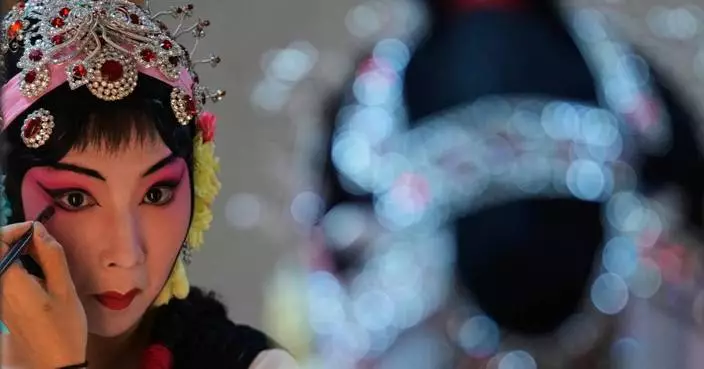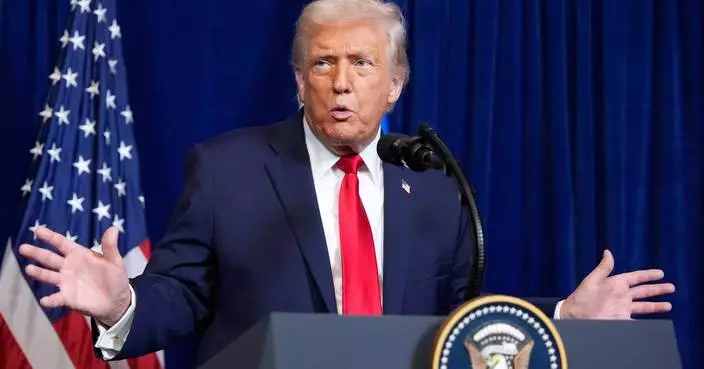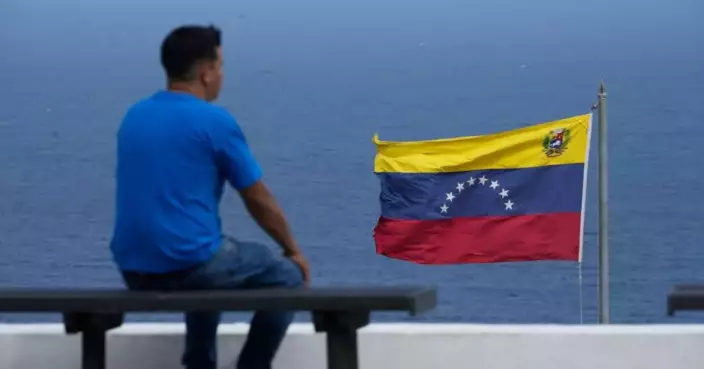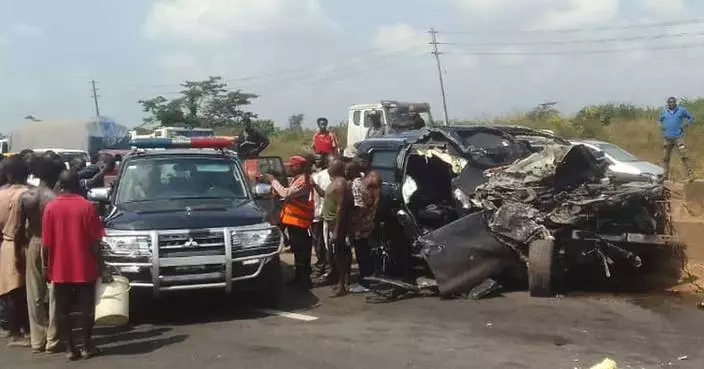Lithuania is relatively small by European Union measures, but it is playing an outsized role as protesters in neighboring Belarus face a brutal law enforcement crackdown following a presidential election they say was rigged.
As the EU’s foreign ministers meet Friday to discuss the crisis, the Lithuanian government's strong pro-democracy voice rooted in decades of resisting Soviet control also serves as a reminder of the bloc’s uneven response so far.
Click to Gallery
People demonstrate in support of Belarusians after a troubled weekend presidential vote, in Warsaw, Poland, Thursday, Aug. 13, 2020. Supporters took to the streets of Warsaw to support crowds of protesters in Belarus who swarmed the streets and workers rallied outside industrial plants to denounce a police crackdown on demonstrations over a disputed election that extended the 26-year rule of authoritarian President Alexander Lukashenko. (AP PhotoCzarek Sokolowski)
People demonstrate in support of Belarusians after a troubled weekend presidential vote, in Warsaw, Poland, Thursday, Aug. 13, 2020. Supporters took to the streets of Warsaw to support crowds of protesters in Belarus who swarmed the streets and workers rallied outside industrial plants to denounce a police crackdown on demonstrations over a disputed election that extended the 26-year rule of authoritarian President Alexander Lukashenko. (AP PhotoCzarek Sokolowski)
People demonstrate in support of Belarusians after a troubled weekend presidential vote, in Warsaw, Poland, Thursday, Aug. 13, 2020. Supporters took to the streets of Warsaw to support crowds of protesters in Belarus who swarmed the streets and workers rallied outside industrial plants to denounce a police crackdown on demonstrations over a disputed election that extended the 26-year rule of authoritarian President Alexander Lukashenko. (AP PhotoCzarek Sokolowski)
People demonstrate in support of Belarusians after a troubled weekend presidential vote, in Warsaw, Poland, Thursday, Aug. 13, 2020. Supporters took to the streets of Warsaw to support crowds of protesters in Belarus who swarmed the streets and workers rallied outside industrial plants to denounce a police crackdown on demonstrations over a disputed election that extended the 26-year rule of authoritarian President Alexander Lukashenko. (AP PhotoCzarek Sokolowski)
People demonstrate in support of Belarusians after a troubled weekend presidential vote, in Warsaw, Poland, Thursday, Aug. 13, 2020. Supporters took to the streets of Warsaw to support crowds of protesters in Belarus who swarmed the streets and workers rallied outside industrial plants to denounce a police crackdown on demonstrations over a disputed election that extended the 26-year rule of authoritarian President Alexander Lukashenko. (AP PhotoCzarek Sokolowski)
Lithuania has given refuge to Sviatlana Tsikhanouskaya, the main opposition challenger in Sunday's disputed election that Belarusian President Alexander Lukashenko claims to have won with 80% of the vote after 26 years of authoritarian rule.
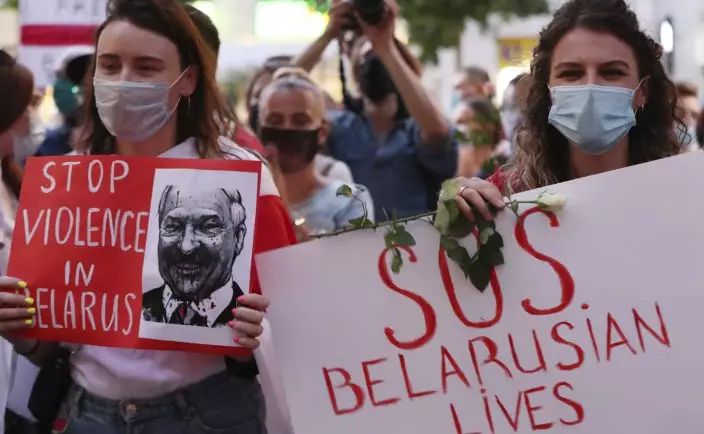
People demonstrate in support of Belarusians after a troubled weekend presidential vote, in Warsaw, Poland, Thursday, Aug. 13, 2020. Supporters took to the streets of Warsaw to support crowds of protesters in Belarus who swarmed the streets and workers rallied outside industrial plants to denounce a police crackdown on demonstrations over a disputed election that extended the 26-year rule of authoritarian President Alexander Lukashenko. (AP PhotoCzarek Sokolowski)
Belarus's northern neighbor also is “ready and considering the possibility of accepting Belarusians, suffering from the ongoing brutalities, on humanitarian grounds,” Lithuanian Foreign Minister Linas Linkevicius tweeted on Wednesday.
With nearly 7,000 people detained and scores injured, the fierceness and scope of the police response to post-election protests was extraordinary even for Lukashenko’s long, iron-fisted tenure. The 65-year-old former state farm director has been in power since 1994 and was nicknamed “Europe’s last dictator” in the West for his suppression of dissent.
Lithuanian President Gitanas Nauseda, in another expression of concern, met Thursday with representatives of nongovernmental organizations operating in Belarus. Meanwhile, editors from Lithuanian news organizations issued a statement condemning the mistreatment of journalists covering the protests and offering assistance to independent Belarusian media.
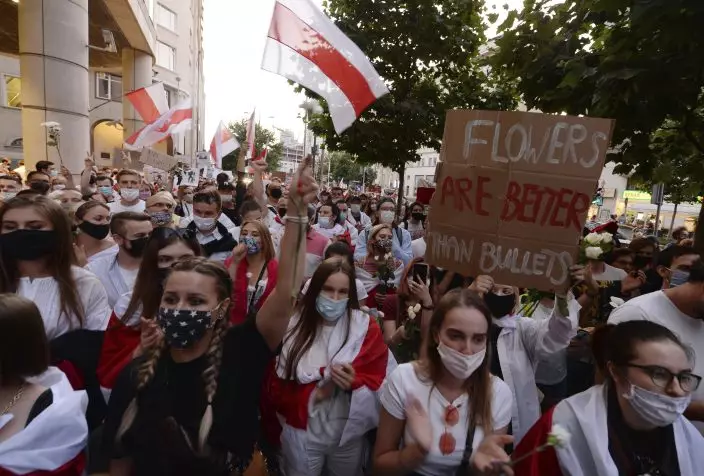
People demonstrate in support of Belarusians after a troubled weekend presidential vote, in Warsaw, Poland, Thursday, Aug. 13, 2020. Supporters took to the streets of Warsaw to support crowds of protesters in Belarus who swarmed the streets and workers rallied outside industrial plants to denounce a police crackdown on demonstrations over a disputed election that extended the 26-year rule of authoritarian President Alexander Lukashenko. (AP PhotoCzarek Sokolowski)
The support is longstanding. Lithuania's capital, Vilnius, is located just 170 kilometers (105 miles) from Minsk, the capital of Belarus, and already has become a center for Belarusians in exile. The city hosts a university that Lukashenko banned. A number of Belarusian nongovernmental organizations have relocated there.
Why the rights of citizens in Belarus matters so much to the people of a small Baltic nation with a population of 2.8 million is rooted in Lithuania's history.
The country was the first former Soviet republic to declare its independence. After that historic step in 1990, Lithuania embraced democracy, joined NATO and the European Union, and then turned to promoting democracy abroad as well.
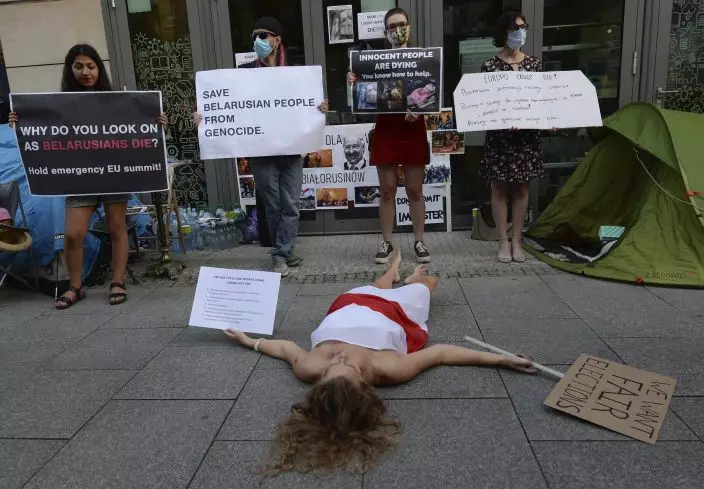
People demonstrate in support of Belarusians after a troubled weekend presidential vote, in Warsaw, Poland, Thursday, Aug. 13, 2020. Supporters took to the streets of Warsaw to support crowds of protesters in Belarus who swarmed the streets and workers rallied outside industrial plants to denounce a police crackdown on demonstrations over a disputed election that extended the 26-year rule of authoritarian President Alexander Lukashenko. (AP PhotoCzarek Sokolowski)
Many Lithuanians, remembering how members of the Lithuanian diaspora supported the independence movements back home, felt a special responsibility to help those with similar aspirations elsewhere in eastern Europe, particularly Ukraine and Belarus. In international forums, Lithuanian officials have often promoted issues of democracy in those two countries.
“Having this historical experience, we believe it’s necessary to support people in Belarus and Ukraine who want to support democracy in their country,” said Laurynas Jonavičius, an assistant professor with the Institute of International Relations and Political Science at Vilnius University.
“It became a part of Lithuanian identity to be a beacon of democracy and a regional leader in democracy promotion,” he said.
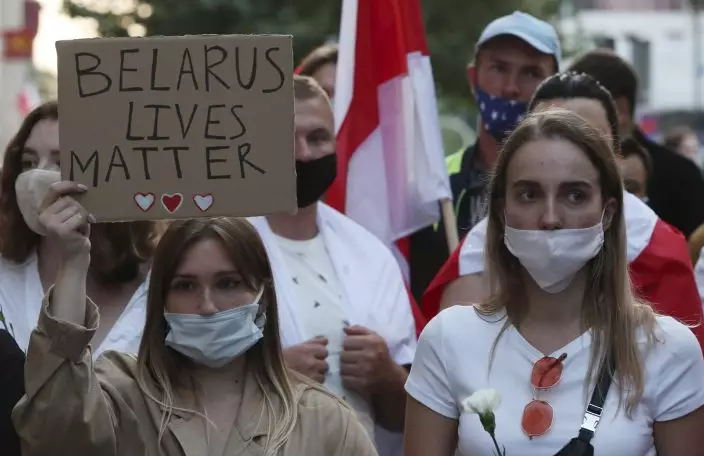
People demonstrate in support of Belarusians after a troubled weekend presidential vote, in Warsaw, Poland, Thursday, Aug. 13, 2020. Supporters took to the streets of Warsaw to support crowds of protesters in Belarus who swarmed the streets and workers rallied outside industrial plants to denounce a police crackdown on demonstrations over a disputed election that extended the 26-year rule of authoritarian President Alexander Lukashenko. (AP PhotoCzarek Sokolowski)
Belarus, located on a strategically important fault line between Russia and Western-oriented NATO countries, poses a difficult challenge to Western nations amid the people's democratic awakening. They have largely kept their distance to Belarus, which has strong ties to Russia, and a strong push for a Western-oriented direction there could also exacerbate ties with Moscow further.
Other countries in the region with communist-era memories of corrupt and authoritarian leaders also have also spoken out on behalf of the anti-government protesters contesting that Lukashenko fairly won reelection to a sixth term.
Slovenian Prime Minister Janez Janša said his government is trying to create pressure on Lukashenko to agree to repeat the election under the strong watch of international election observers, saying it would be “the only peaceful solution for the current crisis.”
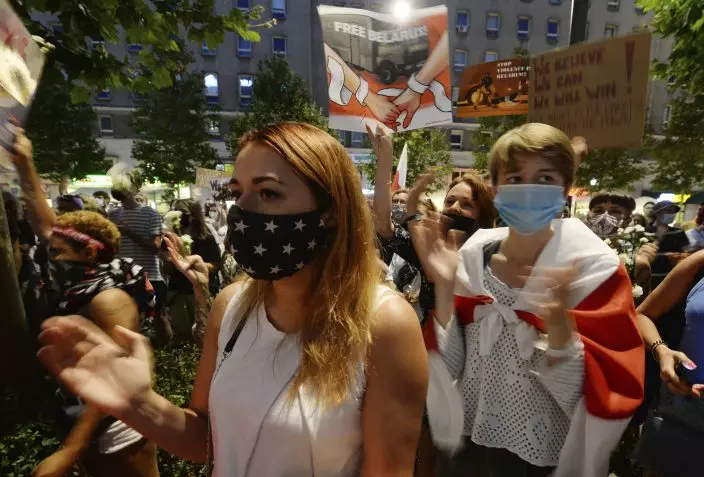
People demonstrate in support of Belarusians after a troubled weekend presidential vote, in Warsaw, Poland, Thursday, Aug. 13, 2020. Supporters took to the streets of Warsaw to support crowds of protesters in Belarus who swarmed the streets and workers rallied outside industrial plants to denounce a police crackdown on demonstrations over a disputed election that extended the 26-year rule of authoritarian President Alexander Lukashenko. (AP PhotoCzarek Sokolowski)
“I think that if President Lukashenko agrees on that, this would solve the whole situation there,” Janša said during a visit by U.S. Secretary of State Mike Pompeo.
“We hope that the European Union will act,” Janša said.
Poland’s government earlier this week called for EU leaders to hold an extraordinary summit, saying there is a need to defend human rights and democracy in Belarus.
Like Lithuania, Poland, an EU member since 2004 that also borders Belarus, has long been a proponent of democratic change in its autocratic neighbor. The Polish government for years has funded a satellite TV channel, Belsat, that broadcasts news into Belarus as an alternative to government propaganda.
But Poland’s voice at the EU level has been weakened by a perception that Poland’s own government is eroding democratic standards with laws giving the ruling party more power over the judicial system and anti-LGBT rhetoric.
While Poland was a strong voice for democracy in Georgia and Ukraine in the past, some Polish commentators in recent days have observed Lithuania taking on the leading role that Warsaw once had at the EU level.
“Lithuania has taken Poland’s place on EU’s eastern policy,” the liberal daily newspaper Gazeta Wyborcza, which is highly critical of Poland’s right-wing government, declared in a headline Thursday.
In the article under the headline, journalist Paweł Wroński argued that Poland has abandoned active diplomacy in eastern Europe aimed at democracy promotion.
“Lithuania is a country that is listened to more carefully on Belarus and presents a more active, coherent and consistent policy towards its southern neighbor,” he wrote.
Matthew Lee in Bled, Slovenia, and Liudas Dapkus in Vilnius, Lithuania, contributed to this report.
MELBOURNE, Australia (AP) — From Paris to Dubai to Sydney, crowds began ringing in the new year with exuberant celebrations filled with thunderous fireworks or jet skis, while others took a more subdued approach.
A countdown to midnight was projected onto the Arc de Triomphe in Paris and Russians celebrated in snowy Moscow. In Japan, temple bells rang and some climbed mountains to see the year's first sunrise and a light show with somersaulting jet skis twinkled in Dubai.
Other events were more subdued. Hong Kong held limited celebrations following a recent fire at an apartment complex that killed 161 people. Australia saluted the new year with defiance less than a month after its worst mass shooting in almost 30 years.
A heavy police presence monitored crowds watching fireworks in Sydney. Many officers openly carried rapid-fire rifles, a first for the event, after two gunmen targeted a Hannukah celebration at Bondi Beach on Dec. 14, killing 15.
An hour before midnight, victims were commemorated with a minute of silence, and the crowd was invited to show solidarity with Australia’s Jewish community.
New South Wales Premier Chris Minns had urged residents not to stay away from festivities, saying extremists would interpret smaller crowds as a victory: “We have to show defiance in the face of this terrible crime."
Indonesia scaled back festivities in solidarity with communities devastated by floods and landslides in parts of Sumatra a month ago that killed over 1,100. Fireworks on the tourist island of Bali were replaced with traditional dances.
Hong Kong rang in 2026 without fireworks over Victoria Harbor after the massive fire in November. Facades of landmarks were turned into countdown clocks and a light show at midnight.
And in Gaza, Palestinians said they hope the new year brings an end to the conflict between Israel and Hamas. “The war humiliated us,” said Mirvat Abed Al-Aal, displaced from the southern city of Rafah.
Pope Leo XIV closed out the year with a plea for the city of Rome to welcome foreigners and the fragile. Fireworks erupted over European landmarks, from the Colosseum in Rome to the London Eye.
In Paris, revelers converged around the glittering Champs-Élysées avenue. Taissiya Girda, a 27-year-old tourist from Kazakhstan, expressed hope for a calmer 2026.
“I would like to see happy people around me, no war anywhere,” she said. “Russia, Ukraine, Palestine, Israel, I want everybody to be happy and in peace."
In Scotland, where New Year’s is known as Hogmanay, First Minister John Swinney urged Scots to follow the message of “Auld Lang Syne” by national poet Robert Burns and show small acts of kindness.
Greece and Cyprus turned down the volume, replacing traditional fireworks with low-noise pyrotechnics in capitals. Officials said the change is intended to make celebrations more welcoming for children and pets.
Police in New York City planned additional anti-terrorism measures at the Times Square ball drop, with “mobile screening teams.” It was not in response to a specific threat, according to NYPD Commissioner Jessica Tisch.
After the ball drops it will rise again, sparkling in red, white and blue, to mark the country’s upcoming 250th birthday. And Zohran Mamdani was taking office as mayor following a private ceremonial event around midnight in an old subway station.
Saaliq reported from New Delhi, India. Associated Press writers around the world contributed to this report.
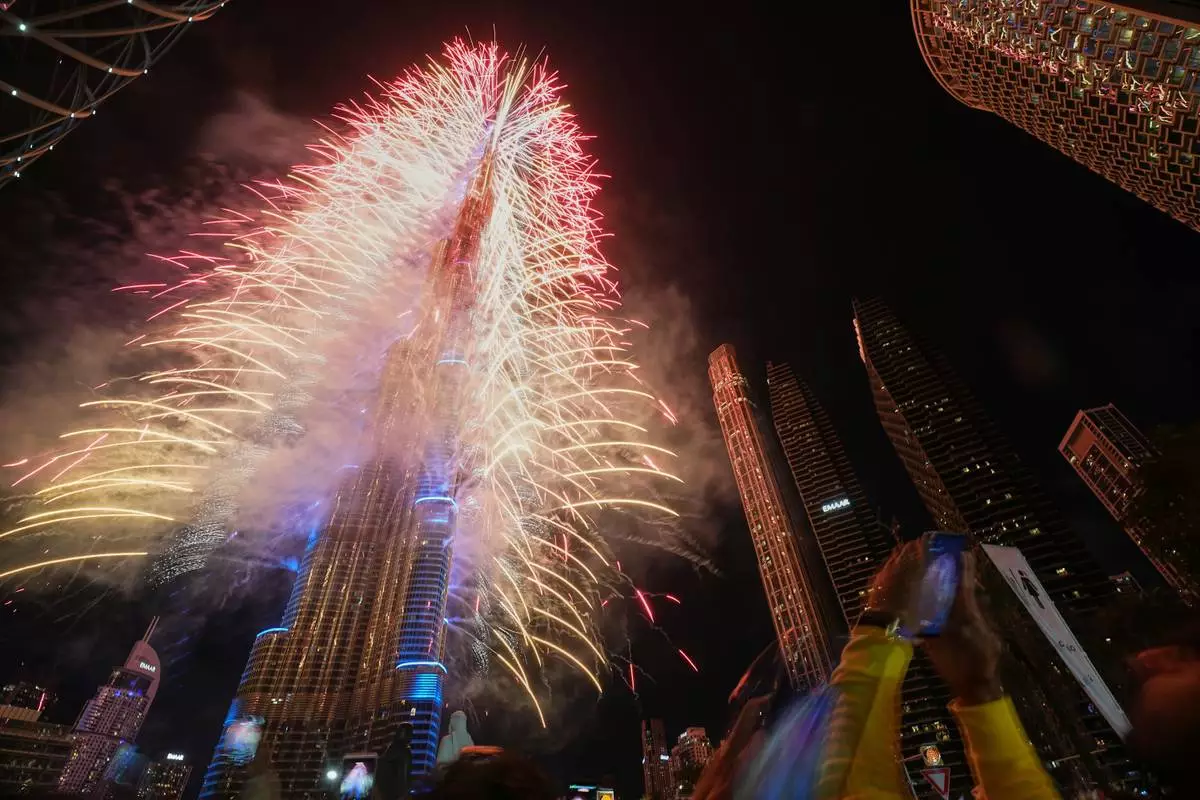
Fireworks explode around the Burj Khalifa, the world's tallest building, during New Year's Eve celebrations in Dubai, United Arab Emirates, Thursday, Jan. 1, 2026. (AP Photo/Fatima Shbair)
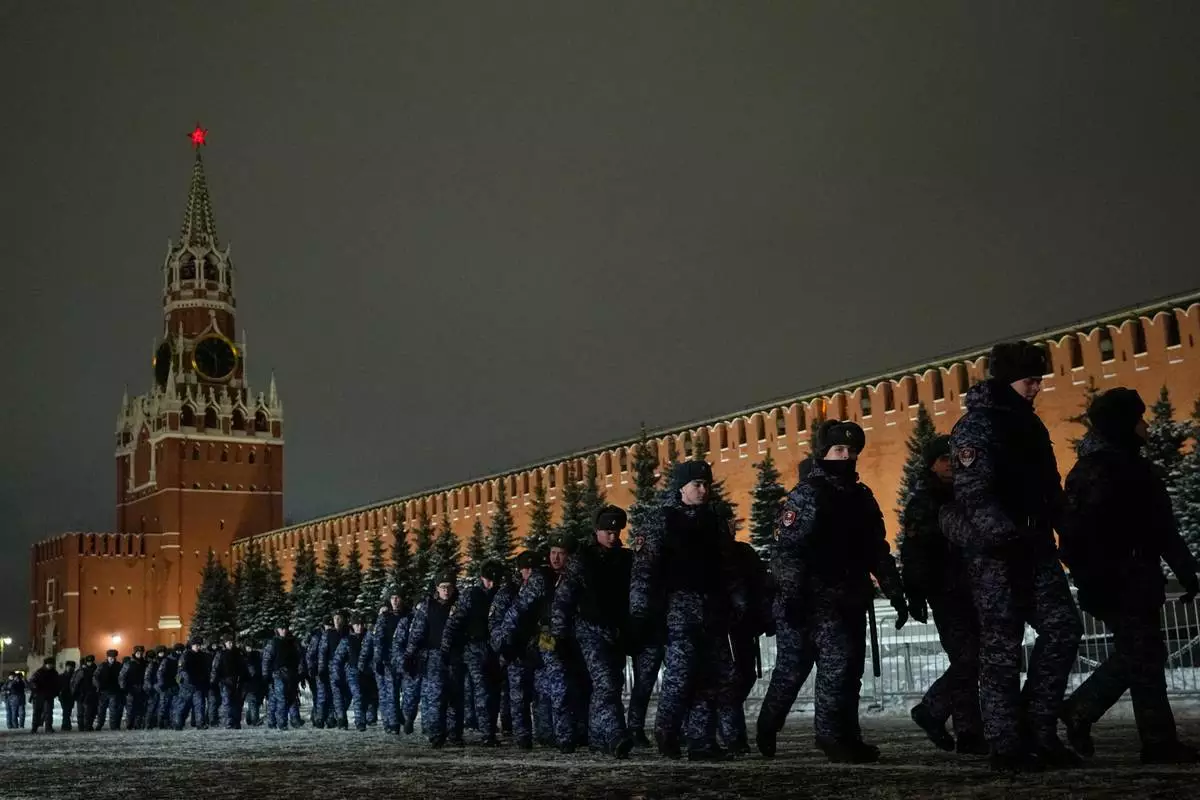
Police and the Rosguardia (National Guard) servicemen walk in the Red Square closed for celebrations on New Year's Eve in Moscow, Russia, Wednesday, Dec. 31, 2025. (AP Photo/Pavel Bednyakov)
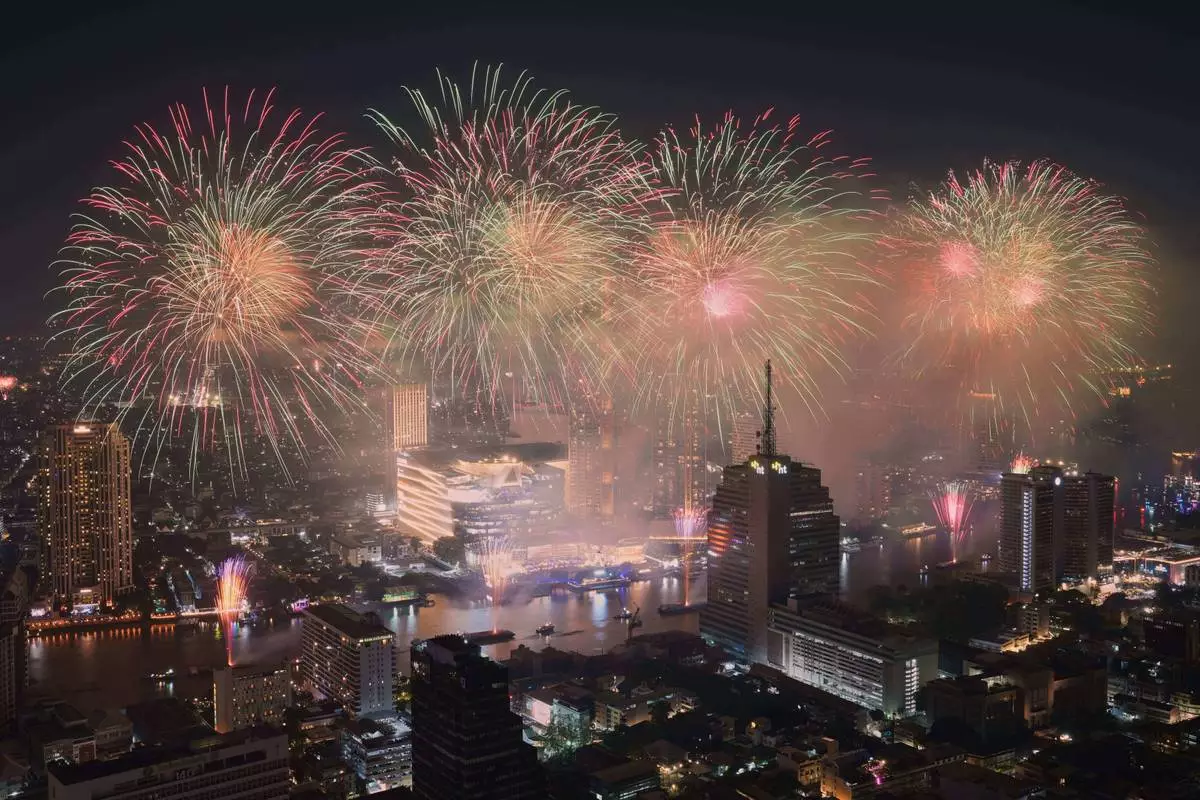
Fireworks explode over the Chao Phraya River during New Year celebrations in Bangkok, Thailand, Thursday, Jan. 1, 2026. (AP Photo/Sakchai Lalit)
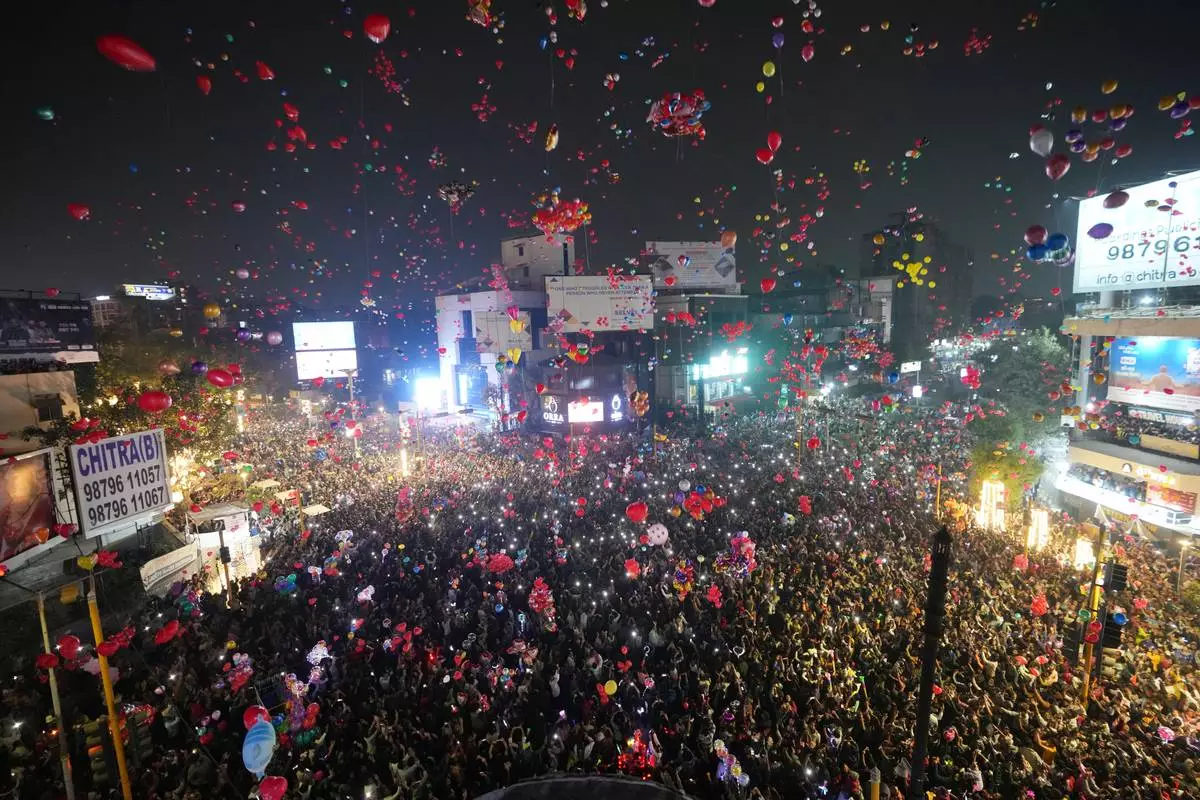
People release balloons as they gather to celebrate the New Year in Ahmedabad, India, Thursday, Jan. 1, 2026. (AP Photo/Ajit Solanki)
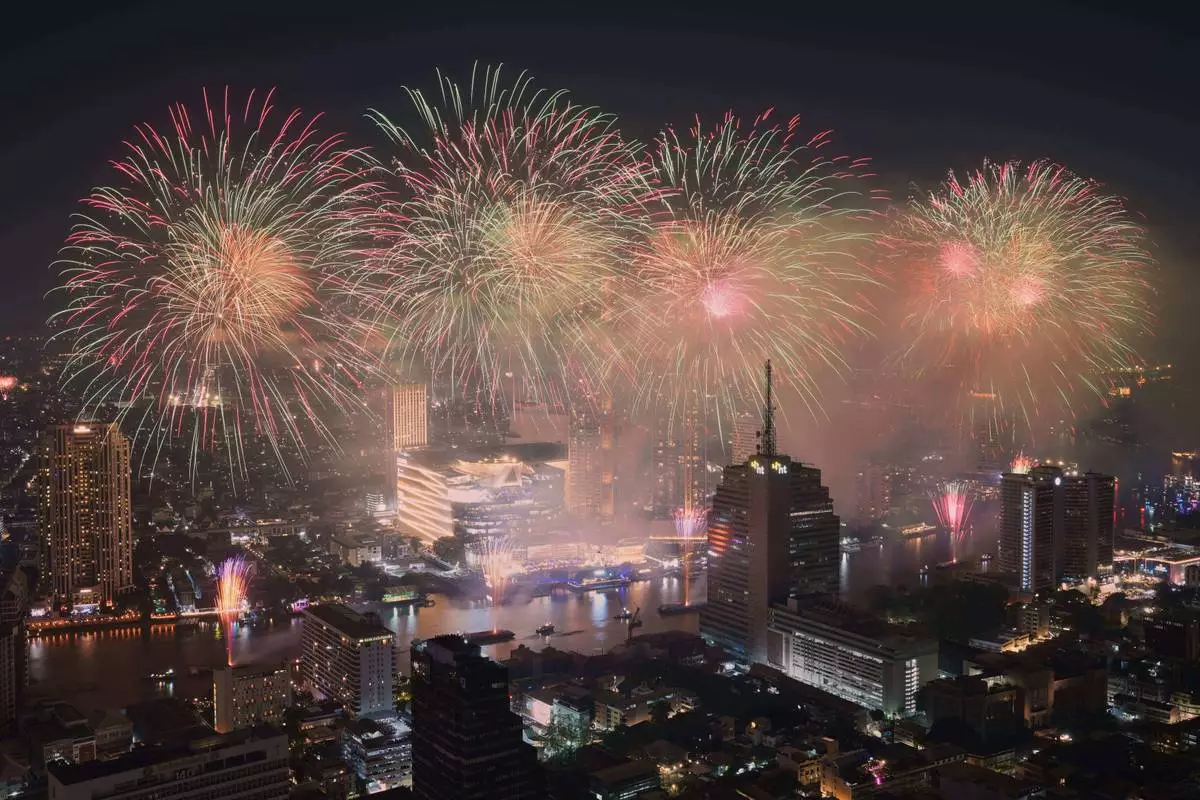
Fireworks explode over the Chao Phraya River during New Year celebrations in Bangkok, Thailand, Thursday, Jan. 1, 2026. (AP Photo/Sakchai Lalit)
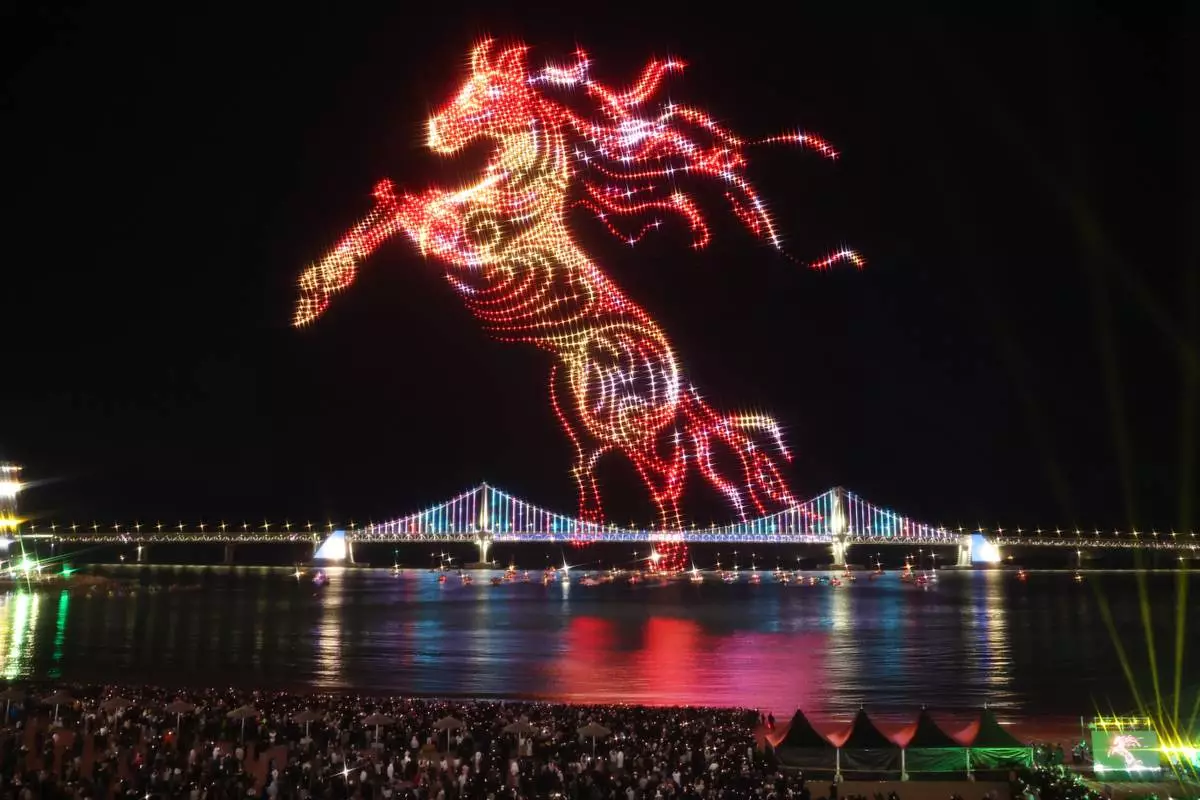
Drones light up the night sky to celebrate the New Year in Busan, South Korea, early Thursday, Jan. 1, 2026. (Kang Sun-bae/Yonhap via AP)
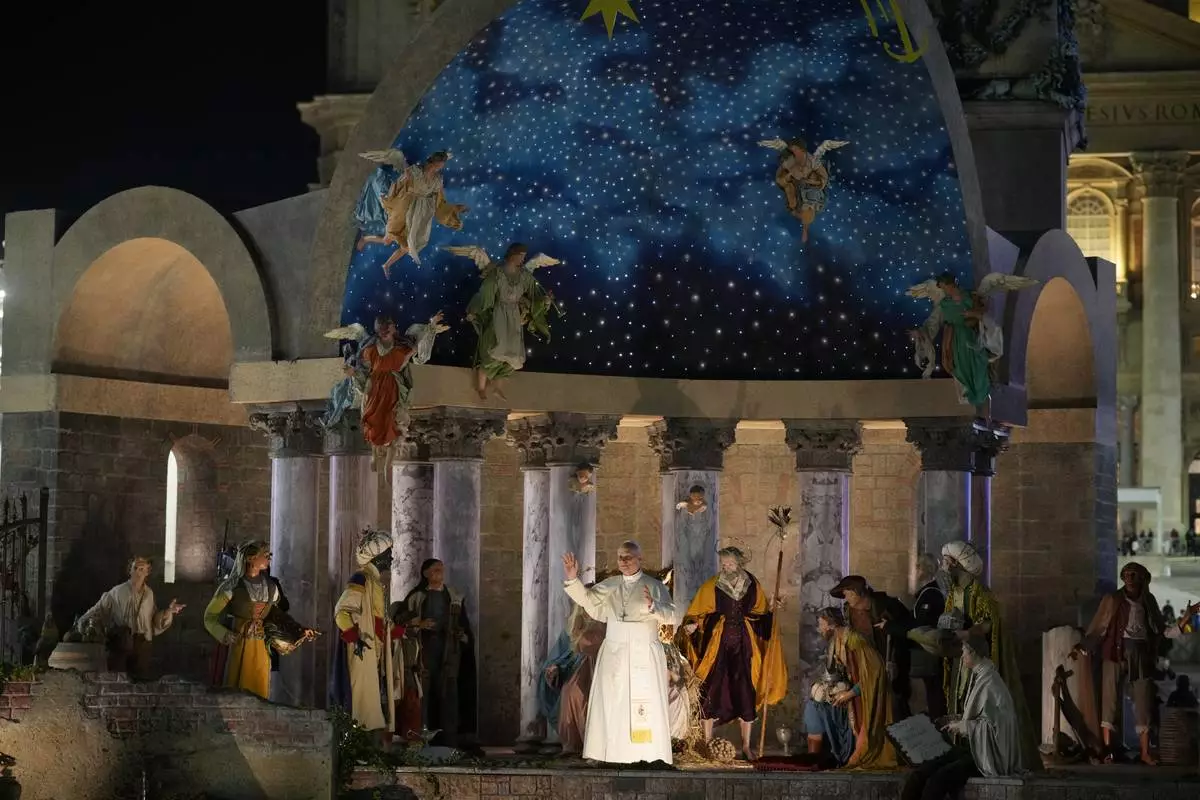
Pope Leo XIV waves after a moment of prayer in front of the nativity scene that adorns St.Peter's Square at the Vatican, Wednesday, Dec. 31, 2025. (AP Photo/Andrew Medichini)
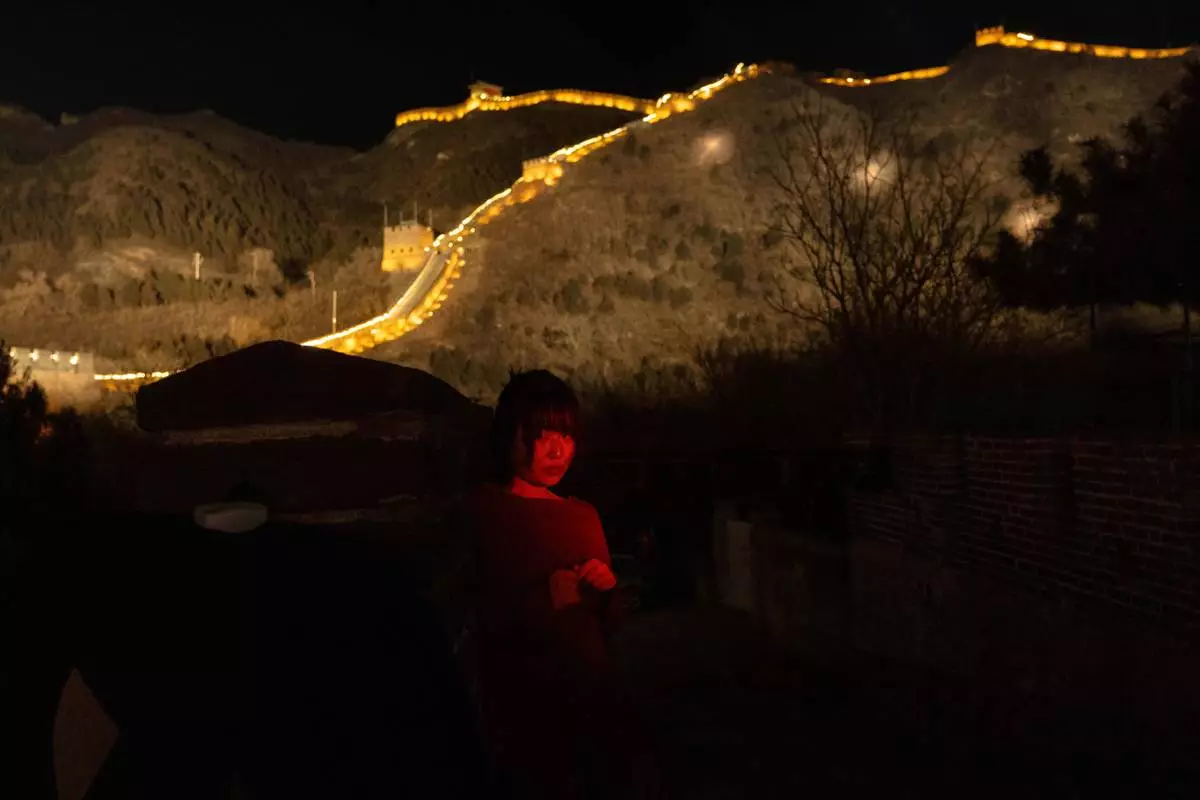
A woman stands for a photo by her friend before an event to ring in the new year at the Juyongguan Great Wall on the outskirts of Beijing, late Wednesday, Dec. 31, 2025. (AP Photo/Ng Han Guan)
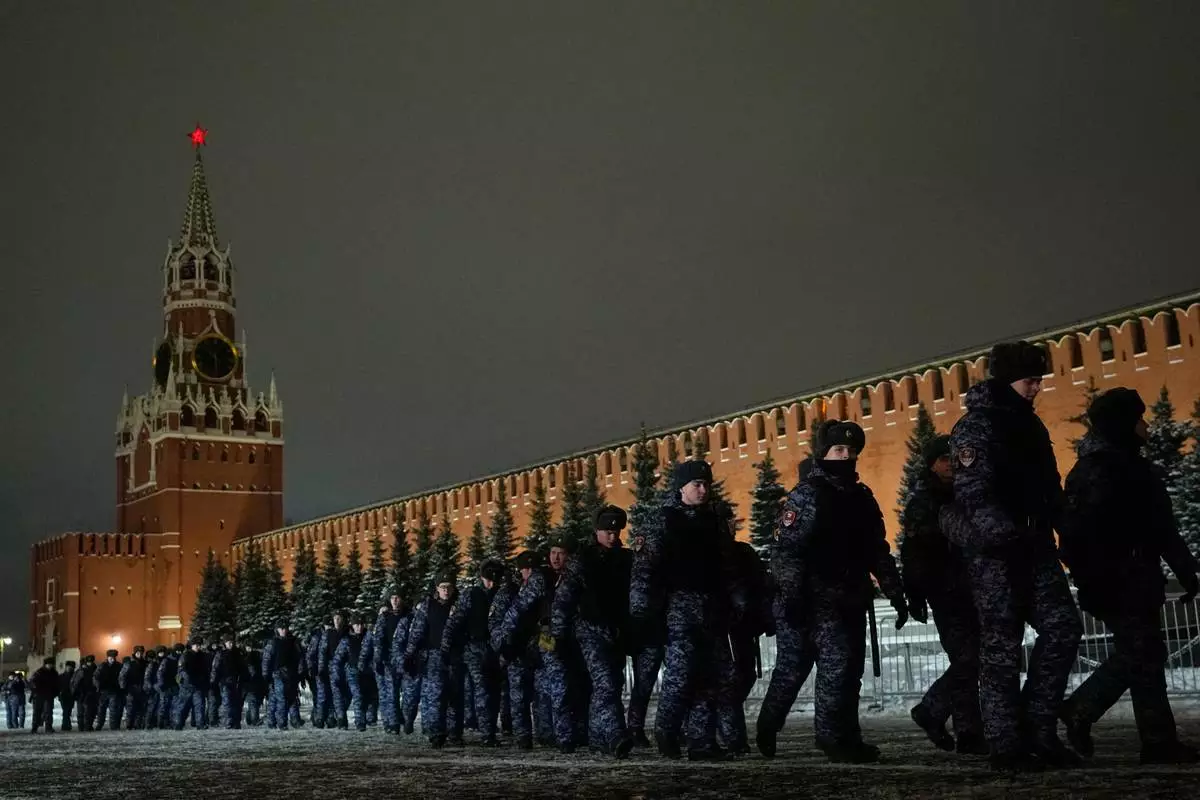
Police and the Rosguardia (National Guard) servicemen walk in the Red Square closed for celebrations on New Year's Eve in Moscow, Russia, Wednesday, Dec. 31, 2025. (AP Photo/Pavel Bednyakov)
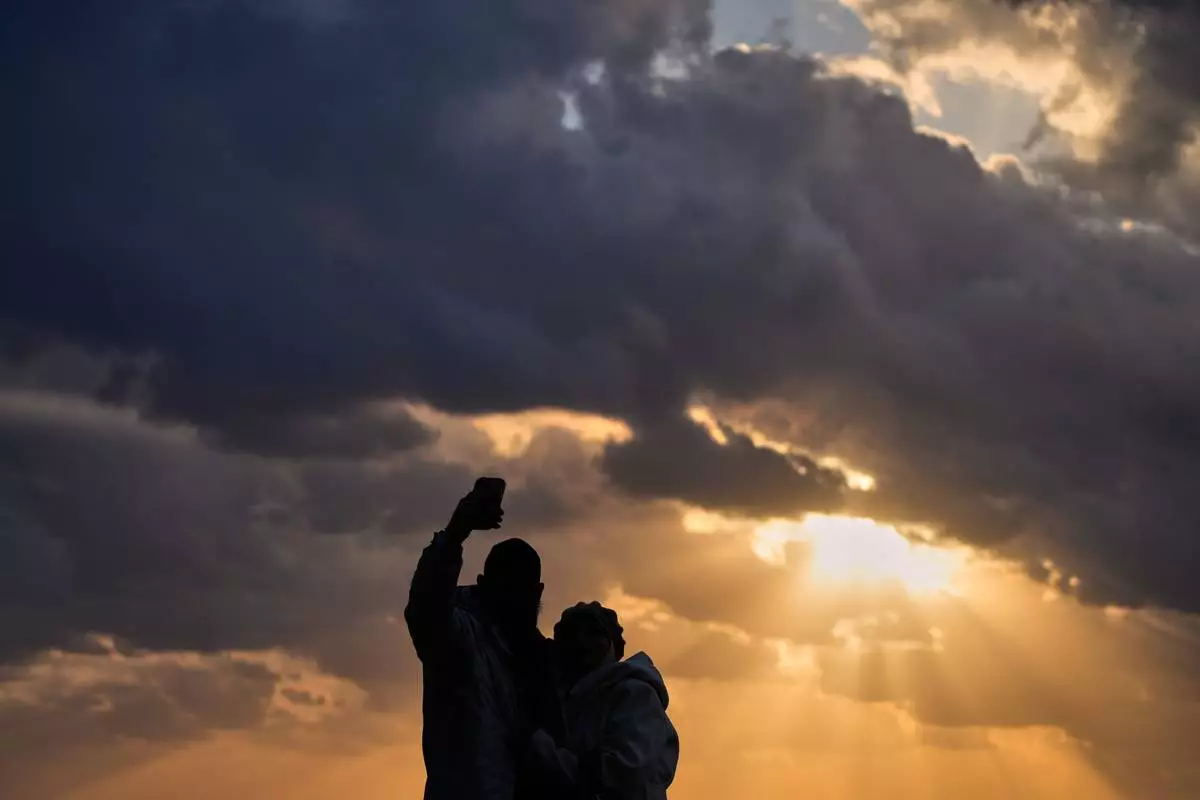
A couple takes a selfie as the last sunset of 2025 is seen over the Mediterranean Sea in Beirut, Lebanon, Wednesday, Dec. 31, 2025. (AP Photo/Hassan Ammar)
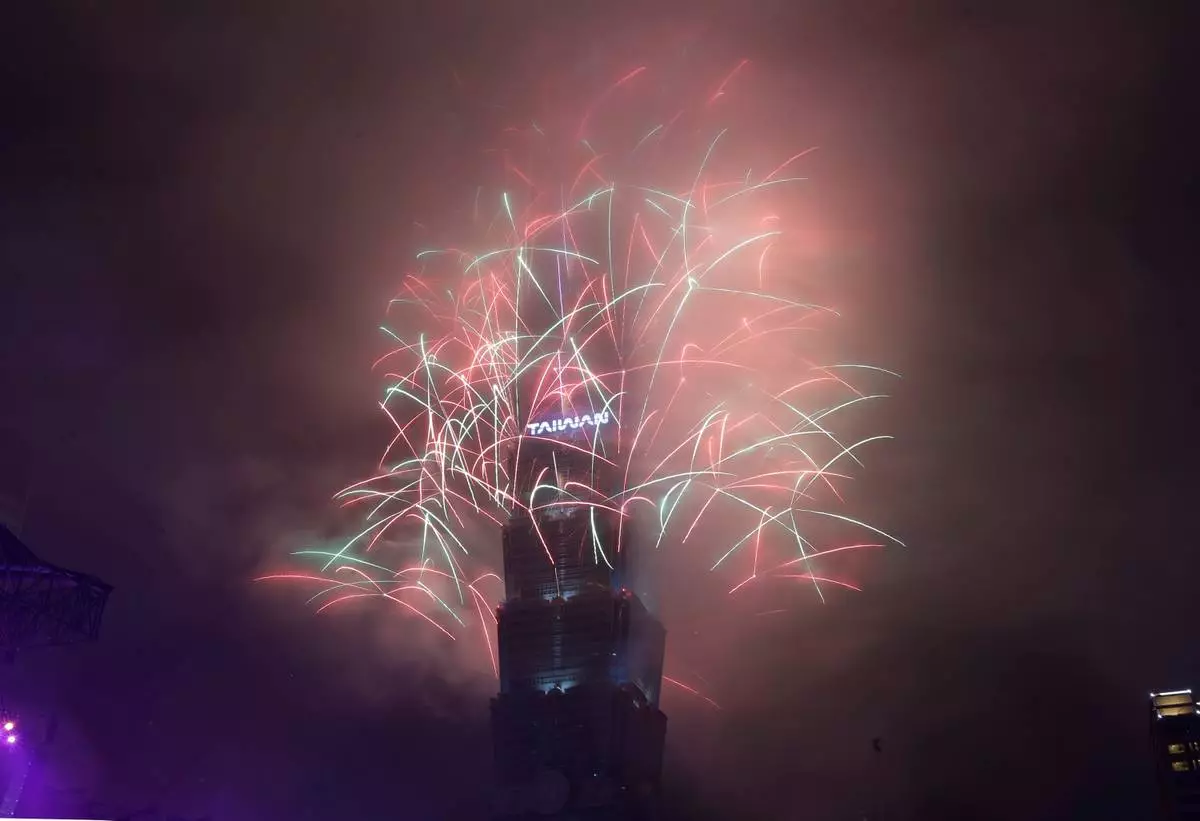
Fireworks explode from the Taipei 101 building during the New Year's celebrations in Taipei, Taiwan, Thursday, Jan. 1, 2026. (AP Photo/Chiang Ying-ying)

People pose for photographs at Lan Kwai Fong to celebrate the start of 2026 in the Central district of Hong Kong, on Wednesday, Dec. 31, 2025. (AP Photo/Chan Long Hei)
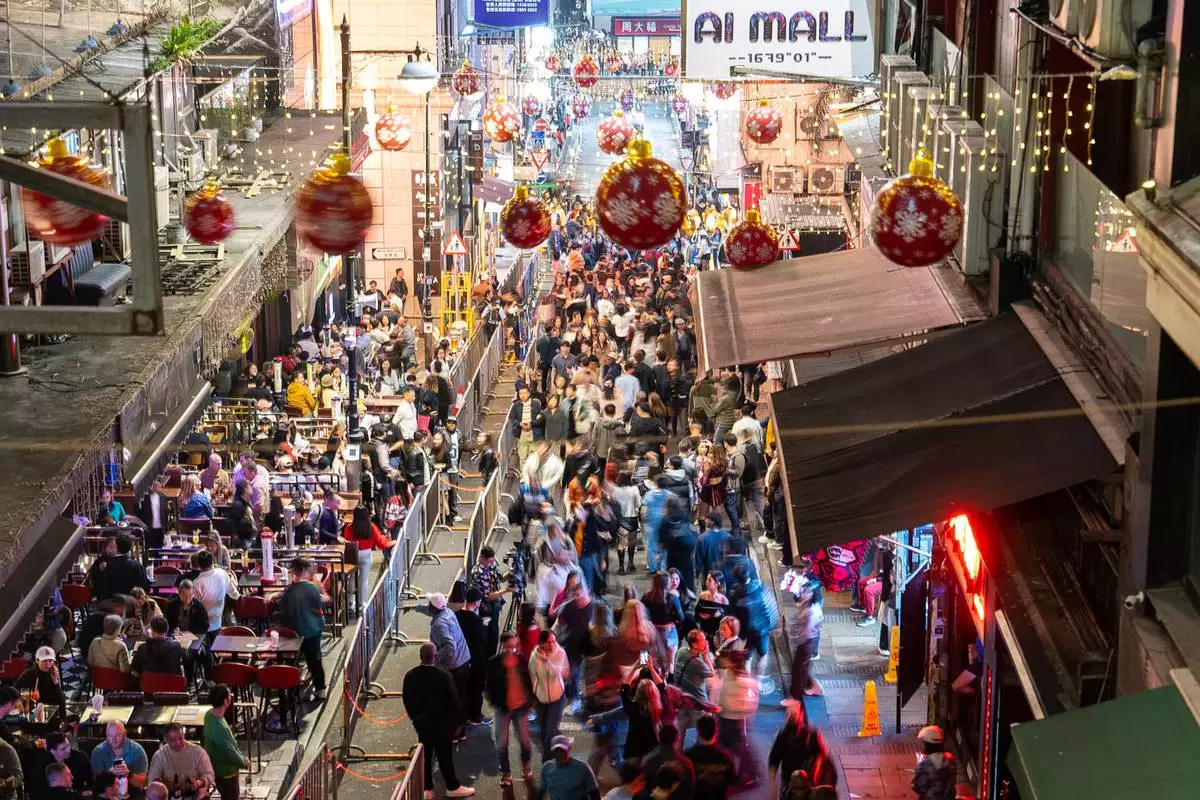
People gather at Lan Kwai Fong to celebrate the start of 2026 in the Central district of Hong Kong, Wednesday, Dec. 31, 2025. (AP Photo/Chan Long Hei)
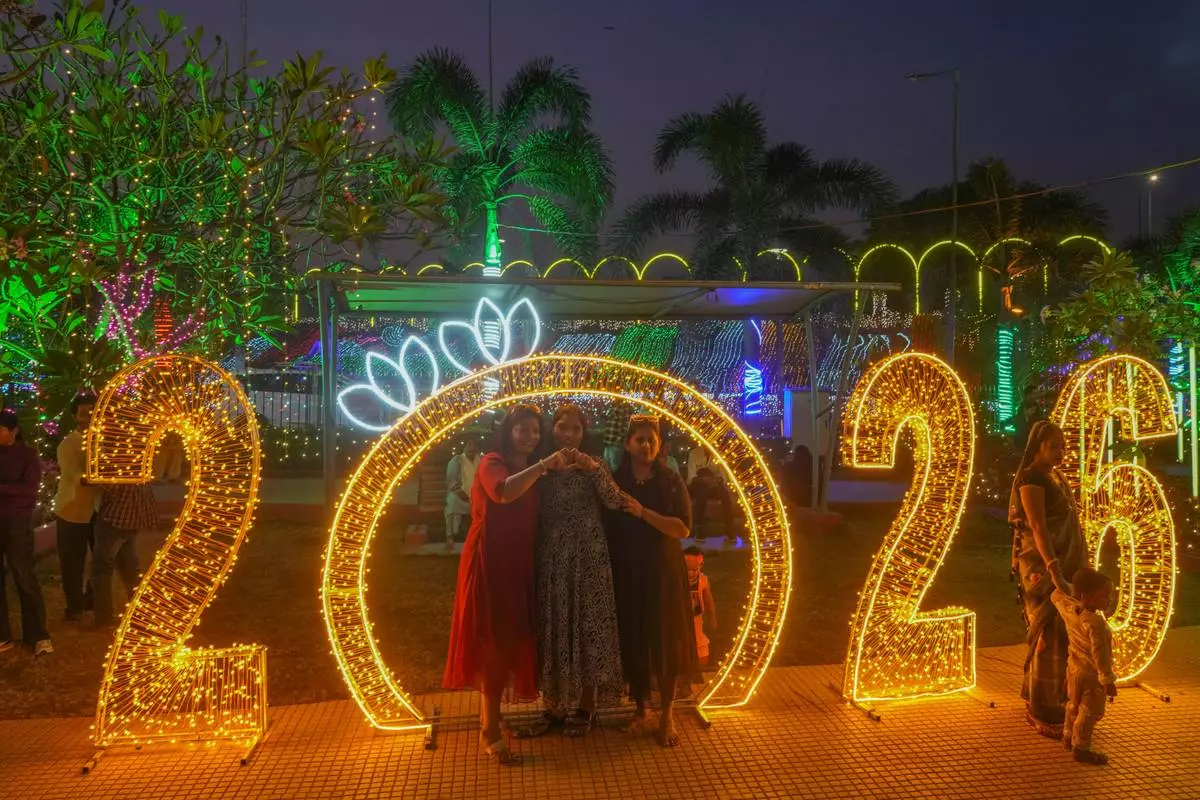
People pose for pictures near illuminated decorations on New Year's Eve in Mumbai, India, Wednesday, Dec. 31, 2025. (AP Photo/Rafiq Maqbool)

The police stand guard during the 2026 Taipei New Year's Party celebration in front of the Taipei City Government Building in Taipei, Taiwan, Wednesday, Dec. 31, 2025. (AP Photo/Chiang Ying-ying)
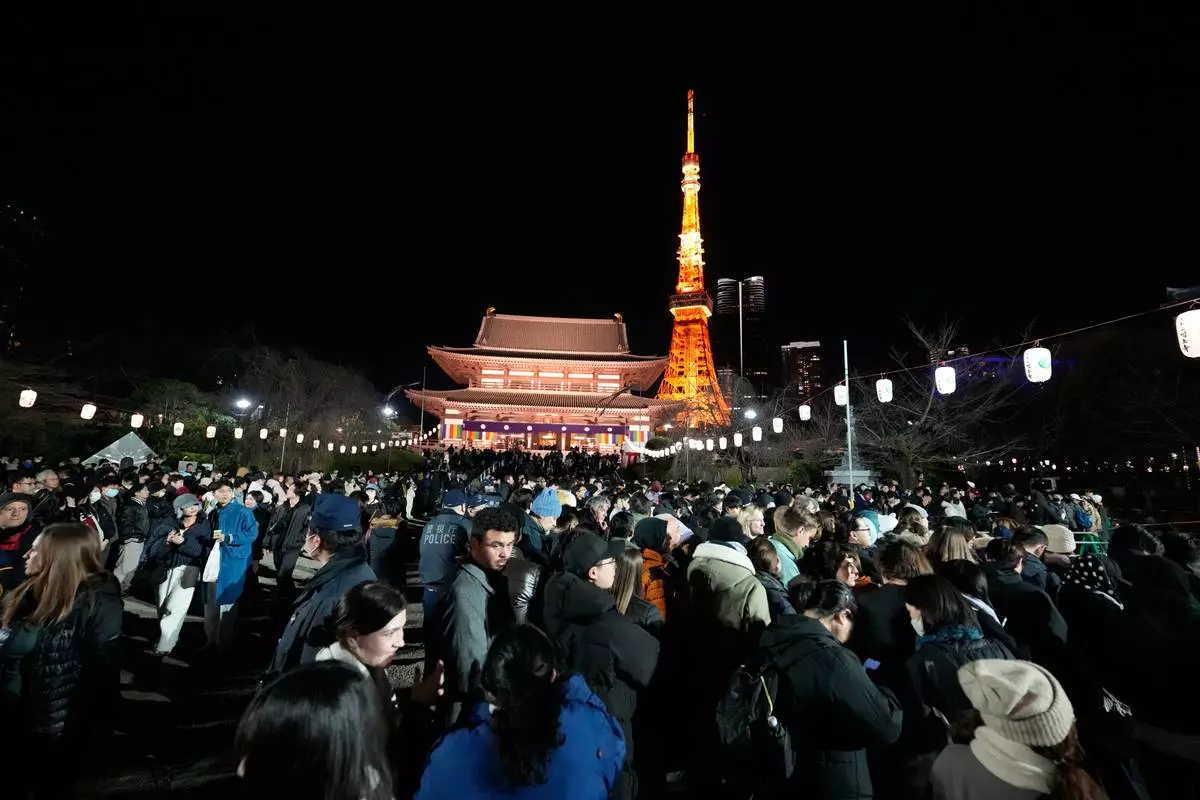
People gather to celebrate the New Year at the Zojoji Buddhist temple, on Wednesday, Dec. 31, 2025 in Tokyo. (AP Photo/Eugene Hoshiko)
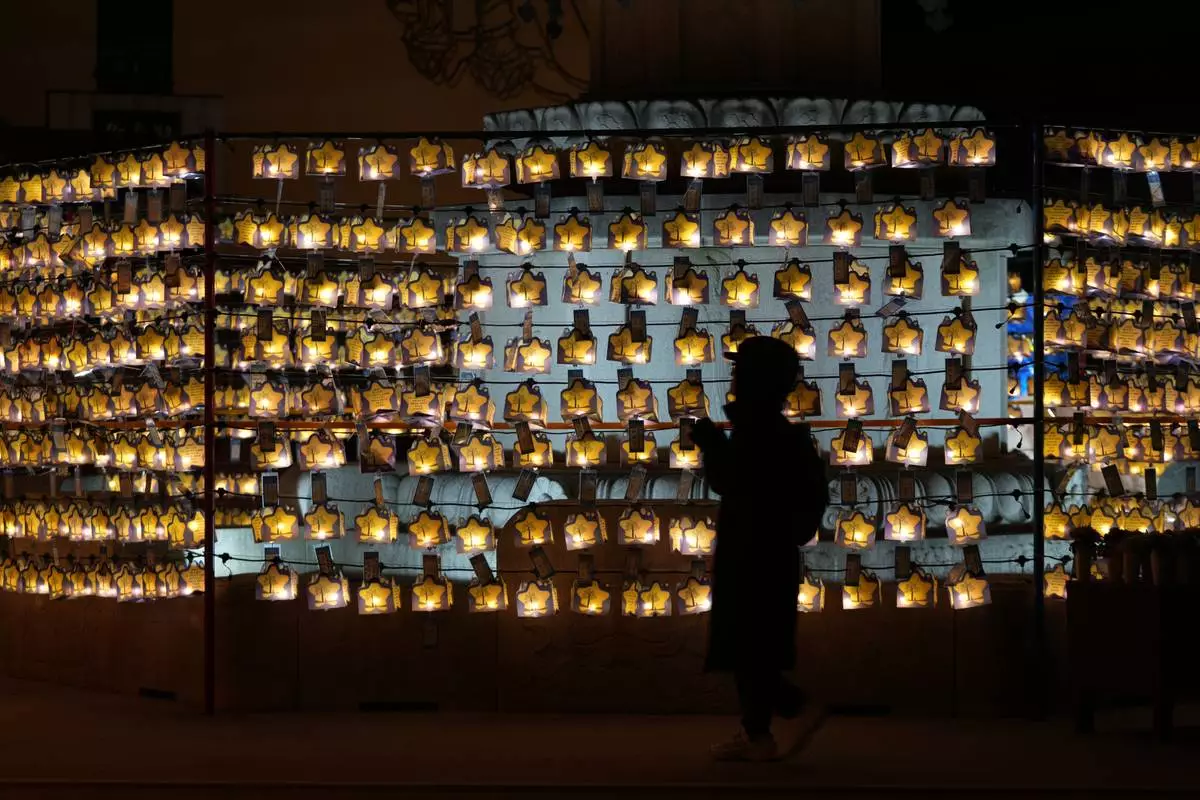
A Buddhist prays in front of lanterns on New Year's Eve at the Jogye temple in Seoul, South Korea, Wednesday, Dec. 31, 2025. (AP Photo/Lee Jin-man)
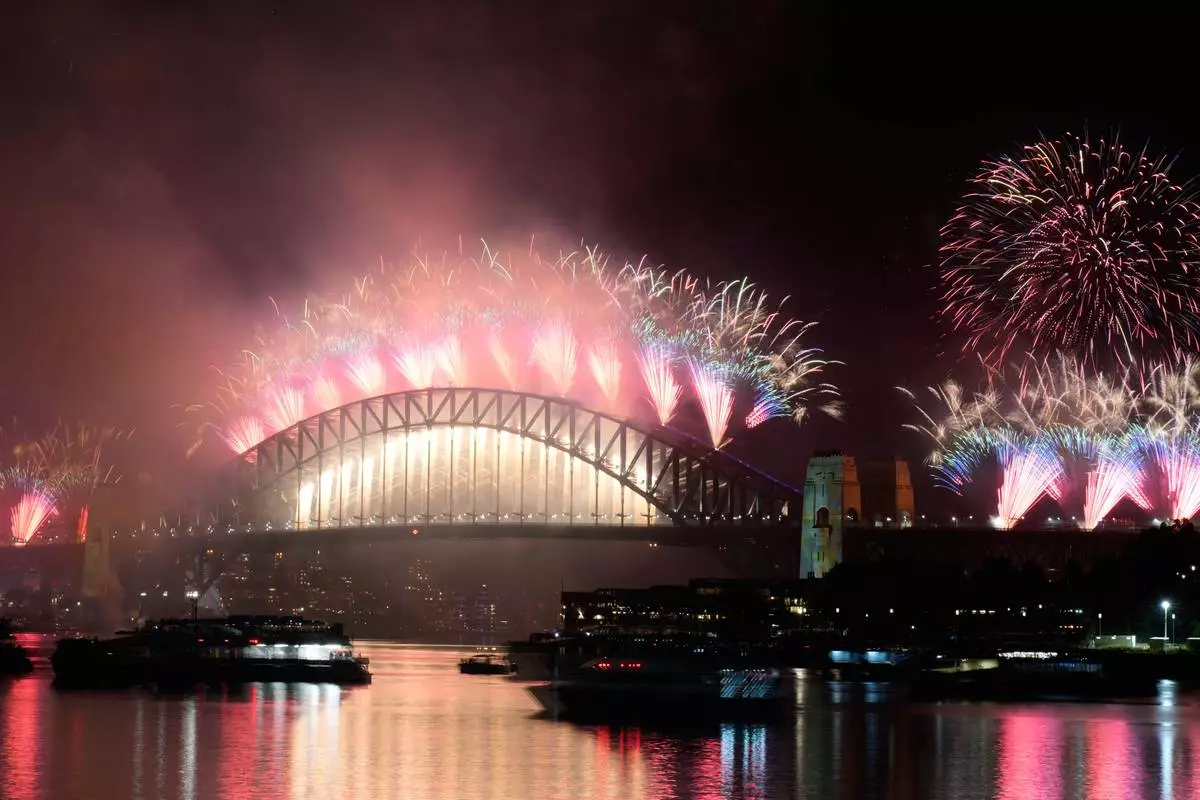
Fireworks burst over the Sydney Harbour Bridge during the New Year celebrations in Sydney, Thursday, Jan. 1, 2026. (AP Photo/Rick Rycroft)

Swimmers enter the water during the traditional Sylvester swim at lake Moossee in Moosseedorf, Switzerland, Wednesday, Dec. 31, 2025. (Anthony Anex/Keystone via AP)
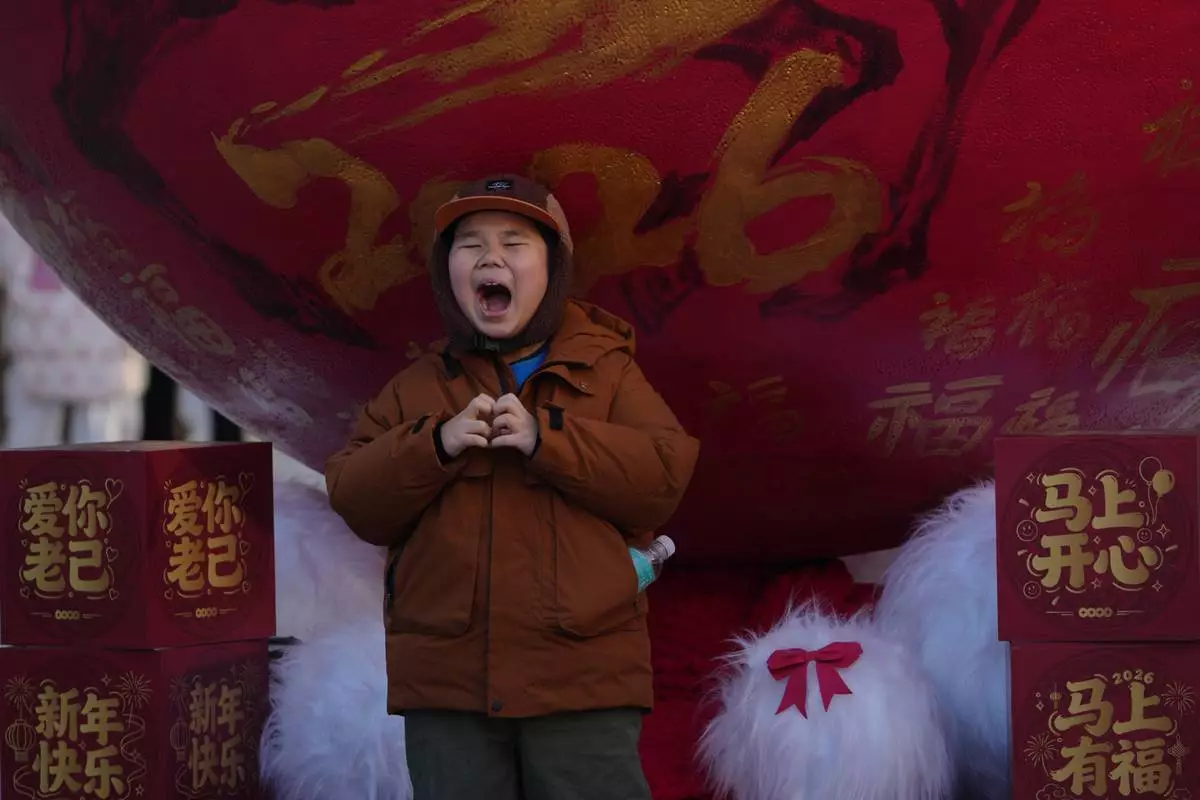
A child poses for a photo with a prosperity decoration to welcome 2026 Year of the Horse, following the Chinese zodiac at a shopping district on new year's eve, in Beijing, Wednesday, Dec. 31, 2025. (AP Photo/Andy Wong)
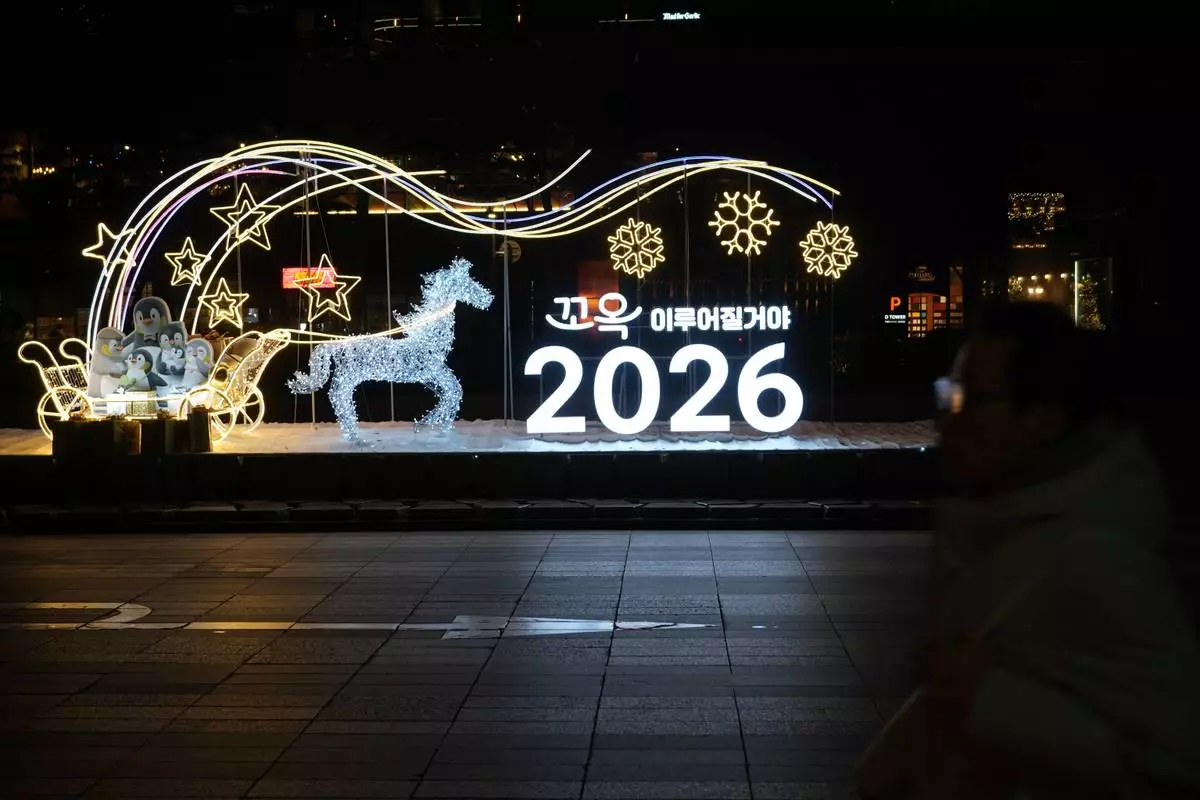
A person walks by illuminated decorations on New Year's Eve in Seoul, South Korea, Wednesday, Dec. 31, 2025. (AP Photo/Lee Jin-man)
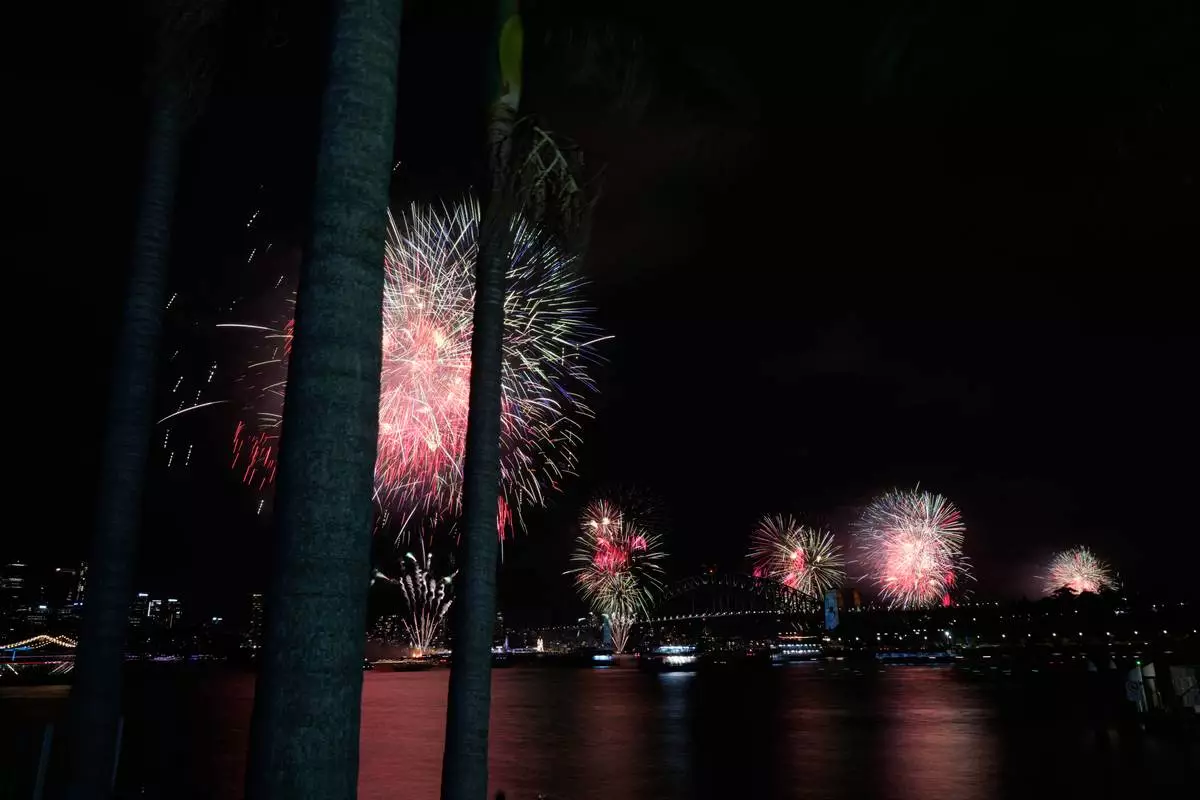
Fireworks burst over the Sydney Harbour Bridge as New Year's celebrations begin in Sydney, Wednesday, Dec. 31, 2025. (AP Photo/Rick Rycroft)
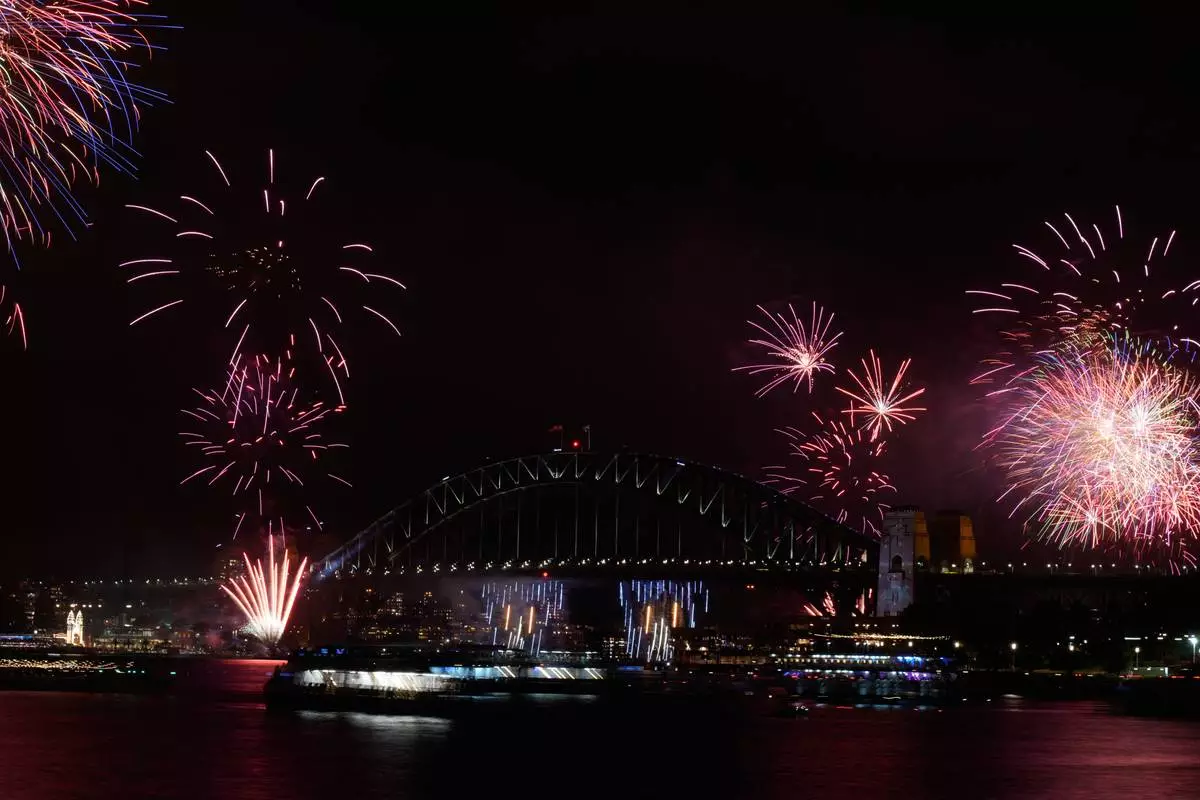
Fireworks burst over the Sydney Harbour Bridge as New Year's celebrations begin in Sydney, Wednesday, Dec. 31, 2025. (AP Photo/Rick Rycroft)
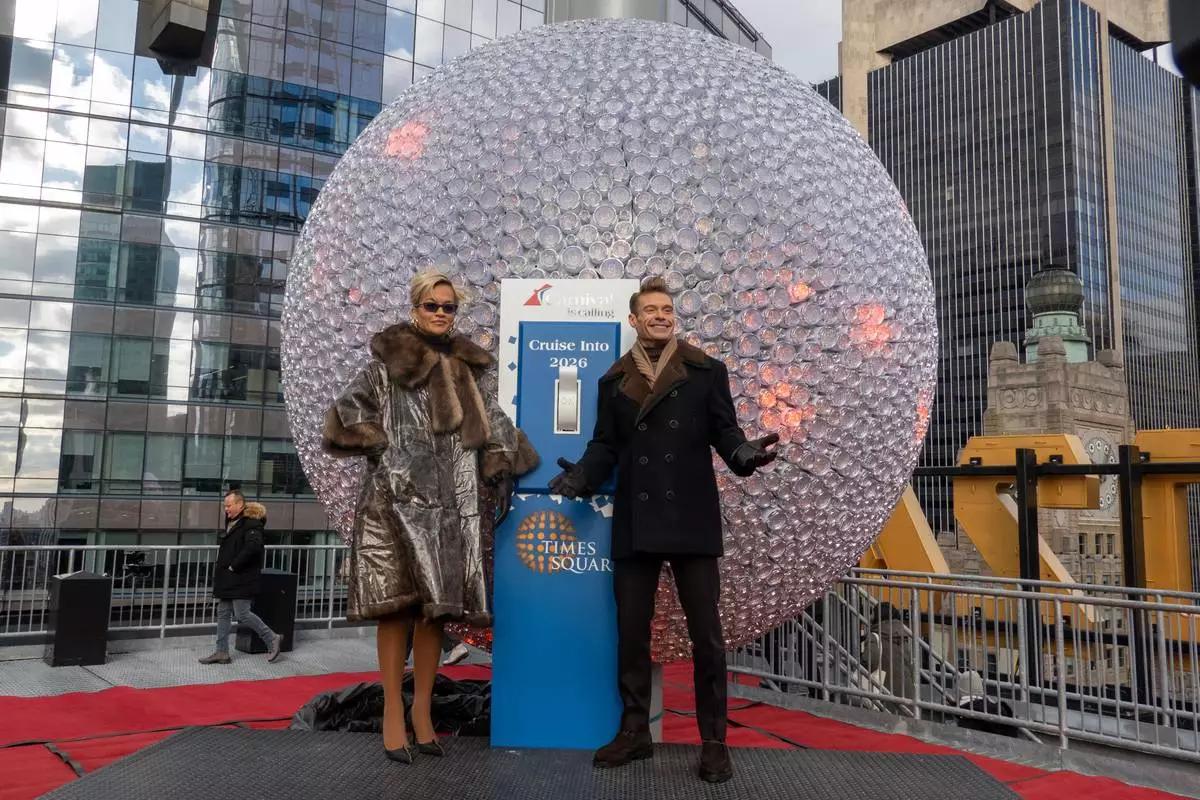
Ryan Seacrest and Rita Ora, hosts of "Dick Clark's New Year's Rockin' Eve with Ryan Seacrest 2026," in New York at the New Year's Eve Times Square Ball on Tuesday, Dec. 30, 2025. (AP Photo/Ted Shaffrey)
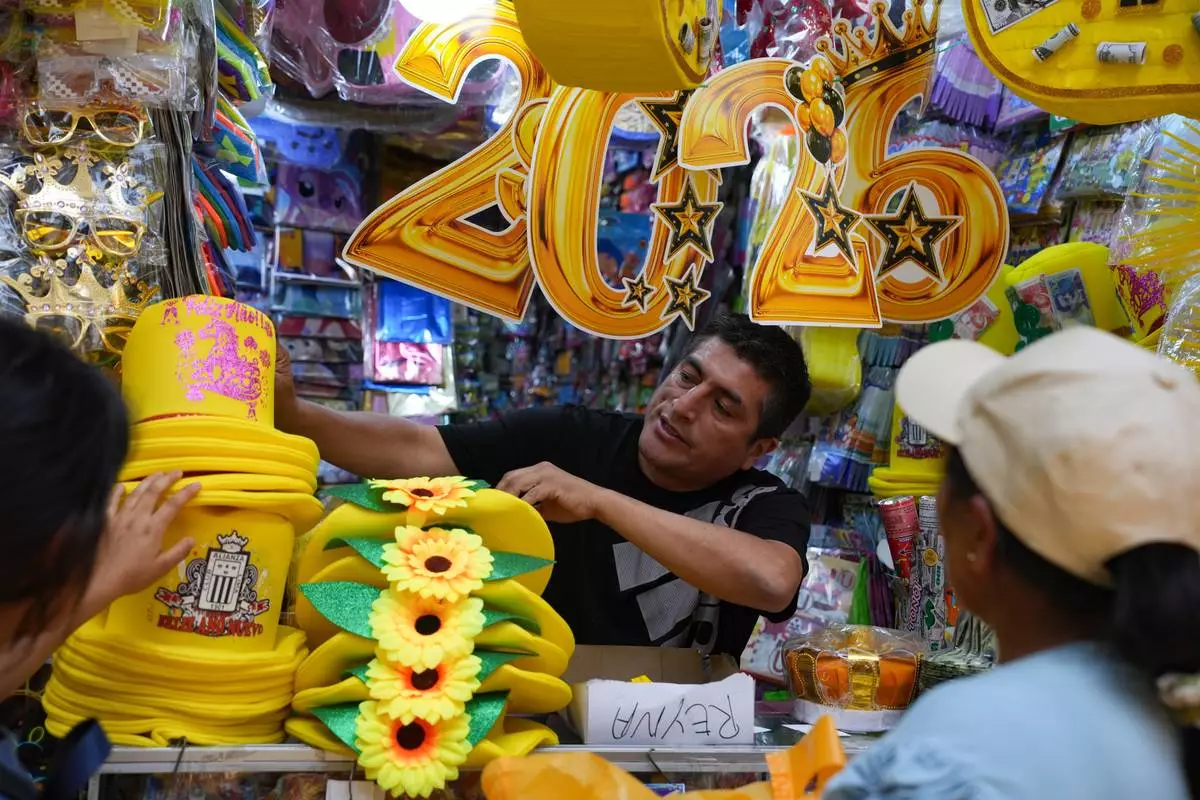
A vendor sells New Year's eve party goods at a market in downtown Lima, Peru, Tuesday, Dec. 30, 2025. (AP Photo/Guadalupe Pardo)
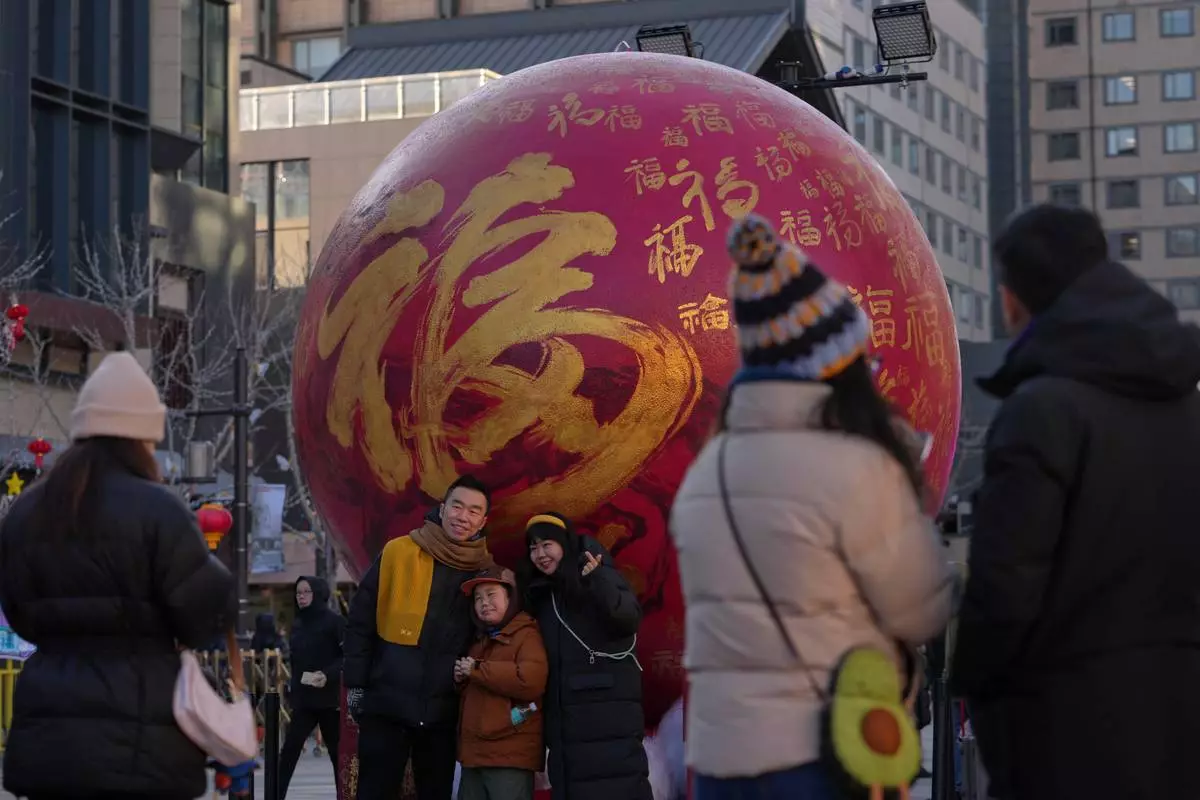
A families pose for a photo with a prosperity decoration to welcome 2026 Year of the Horse, following the Chinese zodiac as people visit a shopping district on new year's eve, in Beijing, Wednesday, Dec. 31, 2025. (AP Photo/Andy Wong)
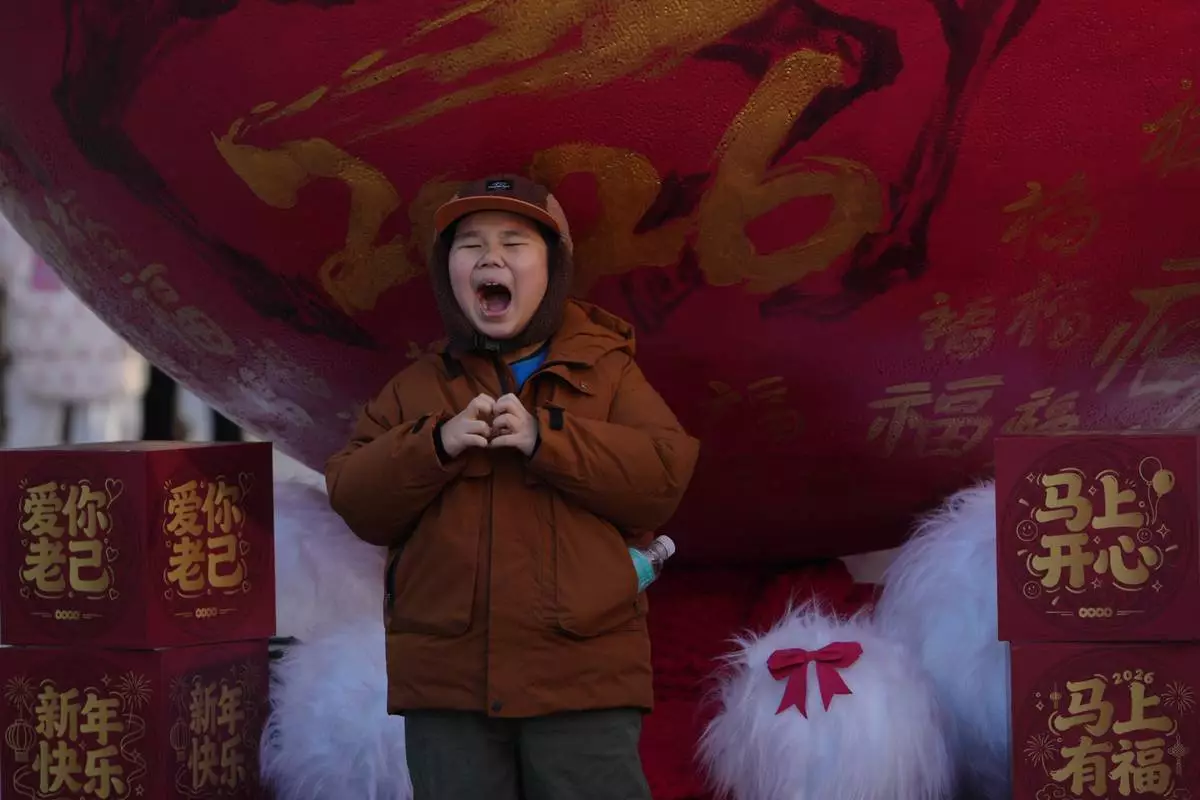
A child poses for a photo with a prosperity decoration to welcome 2026 Year of the Horse, following the Chinese zodiac at a shopping district on new year's eve, in Beijing, Wednesday, Dec. 31, 2025. (AP Photo/Andy Wong)





































